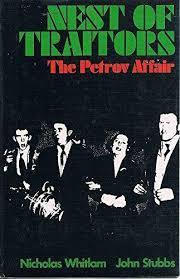Milton, Queensland: The Jacaranda Press, 1974 ISBN 0701607963
The Petrov affair, as it has become known, has - in the twenty-first century - become a footnote of the Cold War; a minor episode in the to-and-fro of the espionage activities of the Eastern Bloc and Western Allies.
At the time it was a major sensation in Australia, which had long been considered a backwater in most aspects of policy and activity in this struggle. Petrov's defection, and the Royal Commission into Espionage initiated by Prime Minister Robert Menzies in its aftermath, changed the political landscape in Australia, led to the toppling of Opposition Leader and head of the Parliamentary Labor Party Doc Evatt, and also led directly to the Labor Split, which consigned that party to opposition for another twenty years.
Therefore the circumstances of Petrov's defection, and of the Royal Commission, have been for many years a source of historical and political angst, not helped by the fact that - given the nature of what occurred - much secrecy surrounds the whole affair.
This book, written by the son of former Prime Minister Gough Whitlam (in fact published while he was running the country) and a journalist, certainly has an agenda to push. That agenda is, that if the defection wasn't actually staged by the Government, it was at least timed by Menzies to help him win the election in which the defection, Royal Commission and the spectre of Communism became major issues. The authors use a classic straw man set up to try and show that many of the documents that Petrov bought with him were manufactured, and that Petrov himself wasn't all that he claimed to be.
While there is little doubt that Menzies used the defection for maximum political advantage, it is also clear that Evatt did much to contribute to his own downfall. By choosing to represent his staffers, who became embroiled in the Commission, he became personally involved himself, and was obsessed with the idea that the documents - the infamous document "J" in particular - were forgeries, and that Petrov, far from being the MVD agent he claimed, was merely a lowly cipher clerk.
Whitlam and Stubbs rely heavily on John Burton and Michael Bialoguski's stories of what happened, and of course on the proceedings of the Commission itself. I find their excoriation of Petrov, based on the Commission's findings, a trifle naive; as even at the time it was clear there was material Petrov had brought with him that was not in the public domain. Many years after this book was written the publication of the Venona decrypts supported Petrov's version and shed light on such additional information that he provided the West. Burton is not an unbiased source, as he was closely allied to Evatt and the Labor Party, and also had strong views about whether Australia should in fact have it's own intelligence and counter-espionage service.
As a guide to the Petrov affair, this book needs to be read with reservations. As a guide to the political storm the defection caused at the time, and was still causing twenty years later, it's a fascinating time capsule.
Cheers for now, from
A View Over the Bell

No comments:
Post a Comment